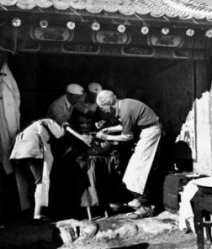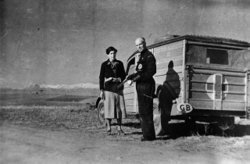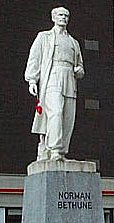Humanitarian Communist
The Communist’s Daughter, Dennis Bock, 2007
This novel is written as a series of disjointed memoirs intended for the daughter he has never met of Norman Bethune a battle field surgeon in China during the war against Japan in 1938 and 1939.

Norman Bethune is an actual historic figure, a Canadian doctor and communist member immortalized by Mao Tse-tung himself who published Bethune’ s memoirs detailing the last five months of his life after Bethune’ s death in China in 1939. Mao said of Bethune;
We must all learn the spirit of absolute selflessness from him. With this spirit everyone can be very helpful to each other. A man’s ability may be great or small, but if he has this spirit, he is already noble-minded and pure, a man of moral integrity and above vulgar interests, a man who is of value to the people.
Bethune was born in 1890 of missionary parents and served in the No.2 Field Ambulance Medical Corps in France as a stretcher-bearer during WWI. His war ended when he was hit by shrapnel. He joined the communist party in 1935 and joined the Republican cause in Spain in 1936-7 as a field surgeon. In Spain he had an intimate relationship with beautiful Swedish born Kajsa von Rothman. They were suspected of spying although neither Rothman nor Bethune were arrested. Bethune left Spain under a cloud. Nothing is known of Rothman’s fate. In 1938 Bethune was in China assisting the communist army in the fight against Japan. He died of a cut received during surgery in 1939. His life has been the basis of at least three films, Dr Bethune was made in China in 1964.

Bethune spent much of his life treating battlefront injuries and developed many tools and techniques. Heroic statues of Bethune have been erected throughout China. Bethune College at York University, Toronto, and Dr Norman Bethune Collegiate Institute in Scarborough, Ontario, were named after him.

The novel portrays Bethune as driven man, incapable of sustaining relationships with woman or friendships with men. He is impatient with others yet seems always willing to teach and to jump in wherever he is needed. Written as his own memoirs for a daughter he has never met, a child by his lover in Spain Kajsa, Bethune emerges as a man who understands very little about himself. Reconstructing his life from his writing would be a challenge should the daughter ever receive the envelopes. In the end, the communist party at the highest level decides to hold the memoirs and decide whether they will be released after their victory in China.